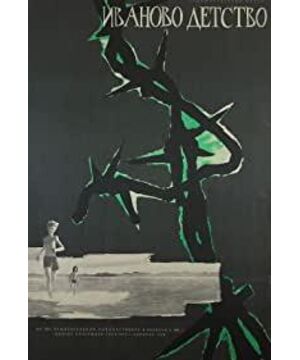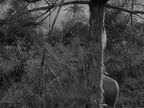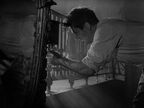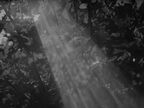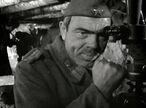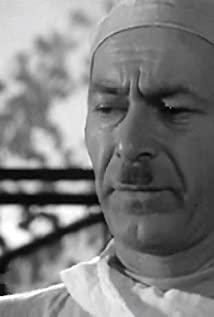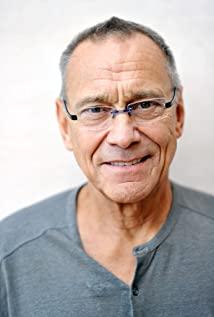Ivan, a little boy, is on the road to revenge because his family was killed by the Germans. In the years of war, everything was in turmoil. No one would have thought of what kind of life a twelve-year-old boy should have, but deep in Ivan’s heart, there are beautiful memories that belong to him, and there is something that belongs to him. Dreamy childhood not to go.
At the beginning of the film, Ivan hides behind a tree trunk and looks around, as if playing hide-and-seek. On the left side of the screen, a complete spider web stands in front of Ivan, implying that the wonderful silence at this moment has passed. The soothing and long music starts, and the camera takes the audience to the top of the trees to look down at Ivan. The black and white tones make the flowers appear weak and pale, but the gentle music like the water lets the audience know that Ivan is standing in full bloom. Flowers on the lawn. The picture immediately cuts to a close-up of the deer's face. In peaceful times, animals are very common. The next moment the camera follows Ivan running, he looks around and sees butterflies flying among the flowers, and he himself is as free as that. Like a comfortable butterfly, it flies. The dreamy atmosphere created by the music, Ivan’s carefree laughter and cuckoo’s "cooing" filled the audience’s ears. We followed Ivan and flew to his mother, the tree in the sun. Mottled, Ivan ran to his mother, drank the water from her mother, and happily told her mother "there is a cuckoo". Tarkovsky used the picture to show the audience a beautiful poem. His film language is romantic and poetic. Everything is too beautiful, and everything will be broken in the next second.
Accompanied by Ivan's sharp yelling, the screen cuts into a darkened room. Ivan wakes up from his dream. When he wakes up, he immediately has the seriousness and rigor that he should have as a scout. He put on his hat and went out cautiously. Tarkovsky’s way of expressing war is quite gentle. When Ivan crossed the river, the woods occasionally lit up, and it looked like fireworks. The appearance of war might seem grandiose, but it is undoubtedly placed on the individual. A disaster, especially for Ivan.
Ivan’s second dream is brought into the audience by long music and dripping sound. The picture advances from the bottom of the well, and we can see Ivan and his mother are discussing the stars at the bottom of the well. The mother said: "For all stars, all moments are night." Ivan reached out to catch the stars in the water. This dream is even more romantic. The fantasy music, Ivan’s laughter and the sound of rippling water fill the ears of the audience. Everything is so beautiful. But after all, Ivan could not hide from the reality of losing his mother. In the dream, the bucket that fell quickly made Ivan feel the feeling of losing his mother again. Tarkovsky was so gentle and gave Ivan a wonderful dream, in which Ivan saw his missing mother; Tarkovsky was so cruel that Ivan in the dream, I can't escape the fact that I lost my mother.
Ivan, who woke up, asked the young officer very calmly. The cold eyes made the audience wonder whether this was a boy who was only twelve years old. Tarkovsky did not use images of artillery fire and broken arms to represent war. Instead, he used a broken young heart to represent war. He treated the audience with the gentleness he treated Ivan as he treated Ivan. The cruel treatment of the audience. Maybe we didn't see any scenes of bloody violence, but from the bottom of our hearts we felt sorry for the little boy who had suffered so much. The poetic realism of the movie makes the audience suffer the same difficulties as Ivan.
When Ivan was alone, he struck the bell, marking the beginning of his road to revenge. He saw the handwriting left by his relatives, he saw the hope left to him by his relatives at the last moment, and hoped that Ivan would take revenge. Strictly speaking, this place should also be regarded as a dream of Ivan. When the relatives left, whether he really left the handwriting for him to revenge, the audience is not sure. But for Ivan, all of these exist, because of their existence, his heart of revenge is firmer. The music in this section is weird and sharp, the pictures are fast-edited, and have a strong expressionist style. All of this shows Ivan’s chaotic, anxious and anxious heart. When he really faced the "enemy," he said emotionally out of control: "You think Did I forget..." Before finishing speaking, he collapsed on the bench and started crying.
It wasn't until Ivan burst into tears that Tarkovsky gave the audience a few exploding images. This is a terrible war after all, and the destruction of people is irreversible. Even Ivan, who looks extremely adult, is just a child. In an age of peace, he will always live a dreamlike childhood, cared by relatives and accompanied by friends. What the audience sees is a childhood destroyed by a child, and the director hopes that we can see more of those lives destroyed by war.
The third dream is the most dreamlike. Ivan fell asleep watching the wall of "Vengeance for Us", the gentle and soothing music gradually started, and a truck carrying apples appeared on the screen. The sky was raining heavily, and occasionally there was lightning. Ivan was sitting on an apple with a little girl. Ivan was looking for an apple that would satisfy the little girl, but the little girl was smiling shyly all the time. Several close-ups of the little girl in the picture are very beautiful. She lowered her head, and the rain was flowing along her hair. Ivan handed her an apple. She looked up and shook her head with a shy smile. Every time the lightning flashed, the little girl's hair dries a little, until at the end, her hair was tied with a hair band, and the bangs on her forehead fluttered in the wind. The shot here is very beautiful and very symbolic. The Apple ultimatum dropped, but the truck continued to drive without knowing it. The war is like this truck. We see it moving forward, but we don’t know where it is. In the process, how much culture was dismantled. Tarkovsky did not tell the audience the whereabouts of the little girl, but through Ivan, the audience mostly guessed her whereabouts, either she was already dead, or just like Ivan, with a vengeful heart. To live. Either way, we don't want to see it, but it is inevitably caused by war.
After Ivan was hanged by the Germans, his childhood showed up in his eyes. The picture takes on the first dream, but the location becomes the beach. Ivan finished drinking water and watched his mother walk away. Then he played games with his friends on the lawn with flowers in full bloom. He went to chase what appeared in the third dream. Little girl, the music is brisk and ritual. They keep running, running all the time, running into the shallows, the water surface is sparkling in the sun, Ivan’s childhood should be as dazzling as this water surface, but because of the war, it’s the last one. Ivan in the picture stretched out his hand to catch the sun behind the tree trunk, just as he wanted to catch his dreamy childhood in that period of peace. But the reality is that he can't catch it. Ivan’s life is a tragedy of the times, and the cold war is a tragedy of mankind.
View more about Ivan's Childhood reviews


